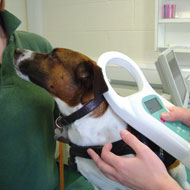Charity calls for unified pet ID system

The Protect Our Pets campaign urges members of the public to call for pets across Europe to be properly identified and registered, and therefore linked to an owner.
A major new campaign has been launched by Eurogroup for Animals which aims to improve the welfare of cats and dogs throughout Europe.
The Protect our Pets campaign hopes to tackle the illegal pet trade across the EU by unifying national systems for the identification and registration of pets.
The system is based on a similar method used for equines and would make it easier to determine where the animal has come from.
The move has been welcomed by Cats Protection, one of over 40 Eurogroup animal welfare member organisations from across Europe.
Cats Protection’s chief executive Peter Hepburn said: “We would welcome the harmonisation of microchip databases across the EU. We frequently see cats coming in from other EU countries with microchips which are incredibly difficult to read and interpret.
"A much clearer, uniformed approach is desperately needed. Whether a cat moves country legally or illegally, or even by accident after climbing into a vehicle, it is essential that the country of origin and the owner of the cat can be traced.”
The Protect Our Pets campaign urges members of the public to call for pets across Europe to be properly identified and registered, and therefore linked to an owner.
They can do this by visiting www.protectourpets.eu and filling in an online form which will send a letter to their Member of European Parliament, calling for immediate action.
Reineke Hameleers, Director of Eurogroup for Animals said: “We want to make the invisible, visible. We want to close the loopholes that allow this trade to flourish, and to ensure that dogs, cats and other pets are protected, both from the trade itself, and from the serious disease and behavioural risks that threaten the health and welfare of all animals and owners alike.”
The campaign also calls on members of the public to urge their elected MEPs to write to Commissioner Andriukaitis, the Commissioner in charge of Animal welfare calling for the harmonisation of identification and registration requirements for pets across the EU.



 The Veterinary Medicines Directorate (VMD) is inviting applications from veterinary students to attend a one-week extramural studies (EMS) placement in July 2026.
The Veterinary Medicines Directorate (VMD) is inviting applications from veterinary students to attend a one-week extramural studies (EMS) placement in July 2026.